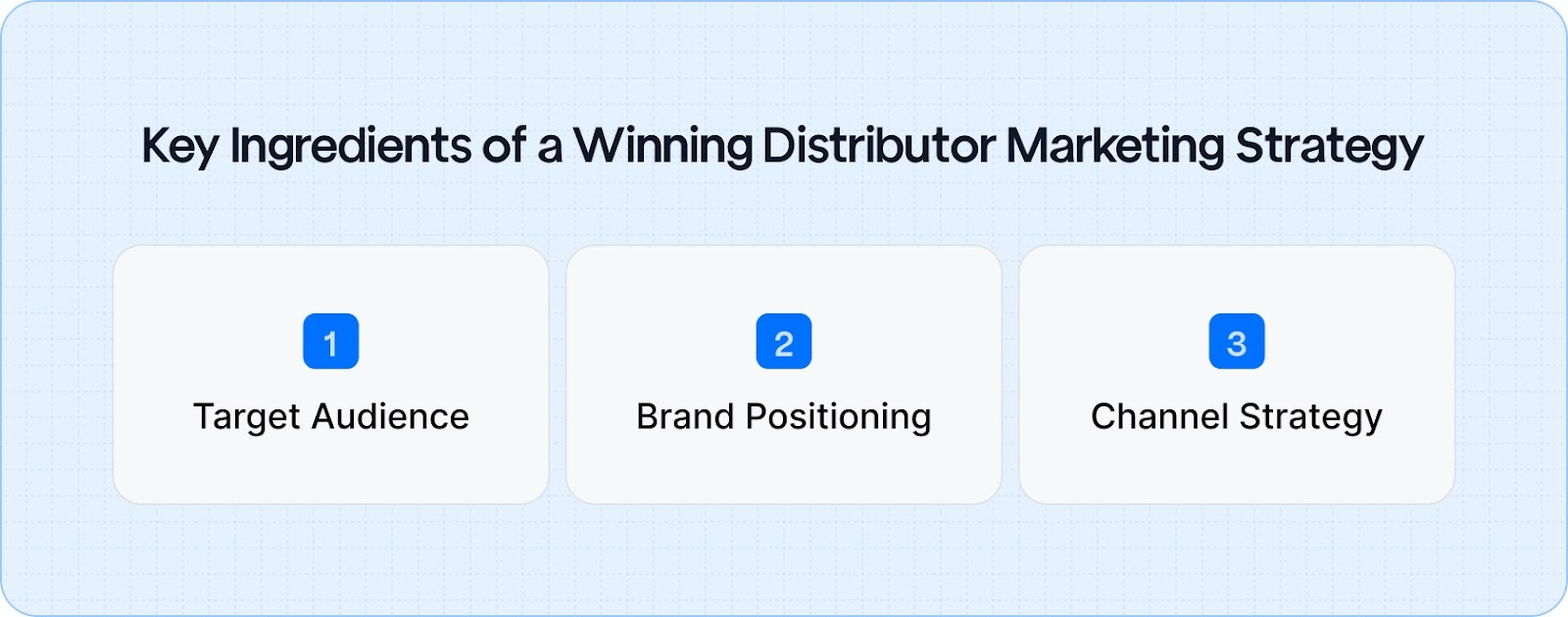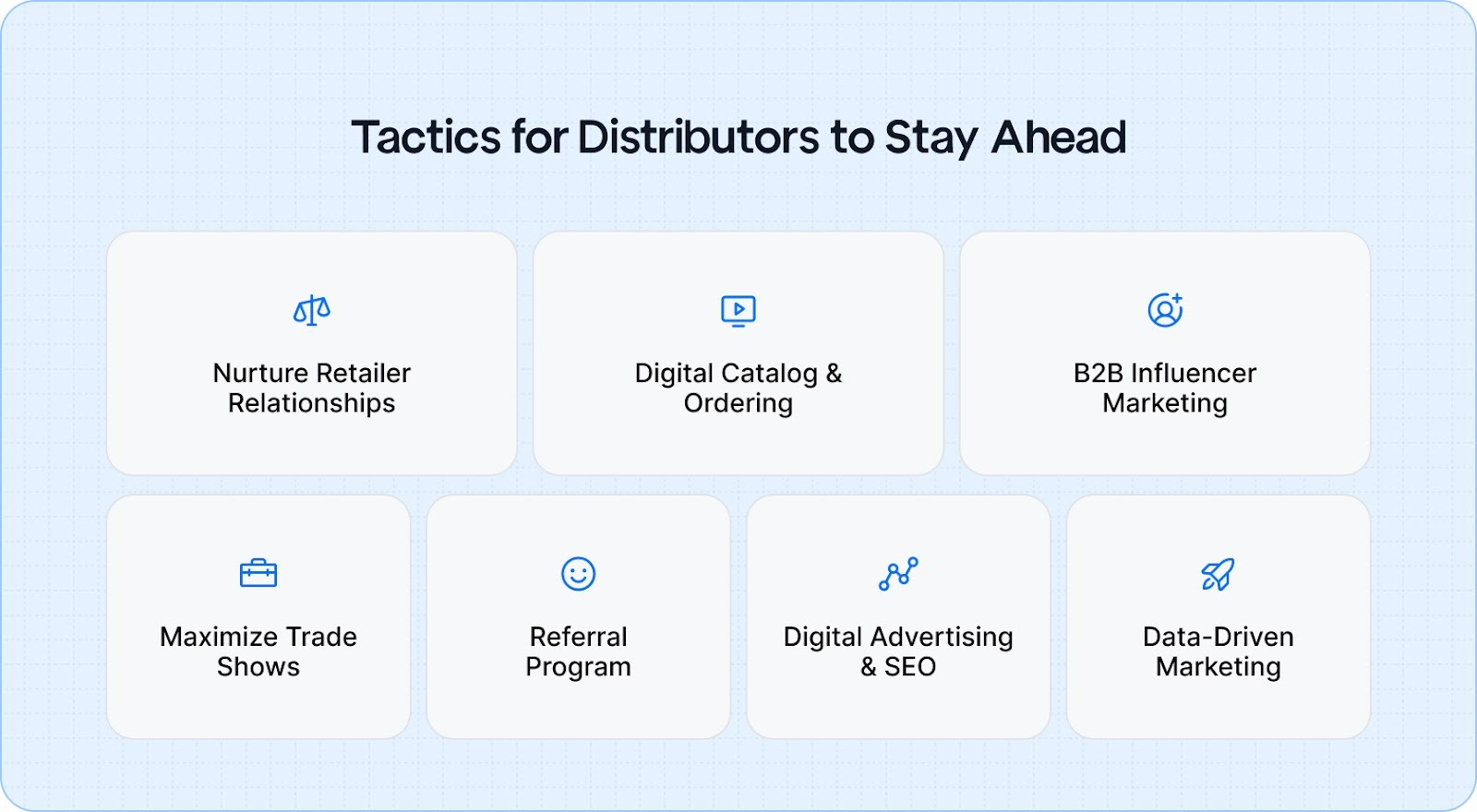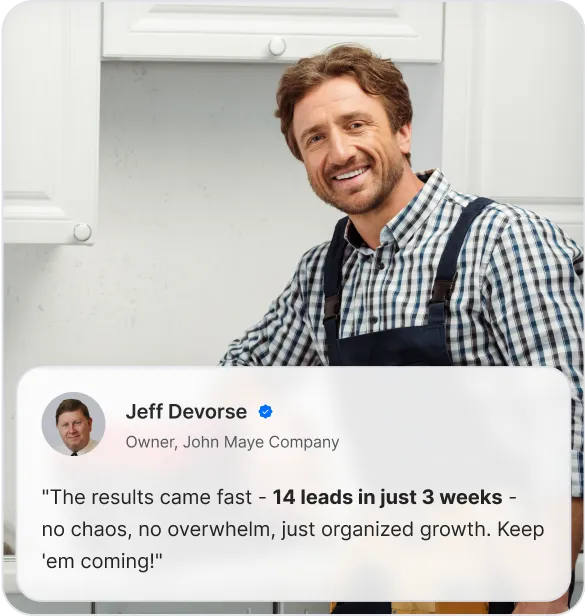With growing competition from direct-to-consumer brands and eCommerce platforms, it’s becoming harder to stand out in a crowded market. What you need is a distributor marketing strategy that targets the right audience and gets your products in front of the right people.
This guide will show you how to build meaningful relationships with the right resellers and retailers, select the most effective channels, and drive higher-quality sales. If you’re frustrated by ineffective marketing and wasted effort, keep reading for strategies that will help your distribution business excel.
What is Distributor Marketing?
Distributor marketing is simply the process of promoting and selling your products through partners like wholesalers, retailers, or other distributors.
Instead of selling directly to the end customer, you rely on these intermediaries to help get your product to market. It's a crucial part of how your products move from your factory to the final buyer.
This strategy includes creating strong relationships with these partners, building awareness of your brand, and driving sales.

The Key Ingredients of a Winning Distributor Marketing Strategy

A successful distributor marketing strategy focuses your efforts on the right people, positioning your product in a way that makes it stand out, and choosing the most effective ways to reach them.
Here are the key ingredients that make your strategy work:
- Target Audience: This is the group of people or businesses you want to reach with your product. For distributors, your audience could be other businesses (B2B) or individual consumers (B2C) who need what you're selling. It’s essential to know who needs your product so you can focus your marketing efforts on them.
- Brand Positioning: This is about how you want your product to be seen in the market. How do you want customers to perceive your product? Are you offering the most affordable option, or are you positioning it as a high-quality, premium choice? Knowing this will help you differentiate your product from others in the market.

- Channel Strategy: Channels are the ways you communicate and sell to your customers. This can include traditional methods like trade shows and catalogs, or modern digital platforms like eCommerce websites. Choosing the right channel helps you reach your audience effectively.
7 Proven Tactics for Distributors to Stay Ahead of the Competition

Competing in the distribution industry can feel like a constant race. However, with the right approach, you can stand out from your competitors.
Here are 7 marketing tactics that will help you strengthen your position in the market and gain a competitive edge:
1. Nurture Relationships with Retailers and Resellers
Building strong, long-term relationships with the businesses that sell your products is key. Offer support, tailored incentives, or exclusive deals to ensure they stay engaged with your brand and prioritize your products.
The goal is to make them feel valued and committed to your brand.
2. Create a Digital Catalog & Streamlined Ordering System
Investing in a digital catalog is a game-changer for ease and accessibility. With high-quality images, detailed descriptions, and updated prices, your catalog makes it easier for retailers to view and order products directly from you.
This enhances the buying experience and reduces friction for your resellers.
3. Leverage B2B Influencer Marketing
While influencer marketing is often associated with consumer-facing brands, it's becoming increasingly important in B2B as well.
Partner with industry experts or thought leaders to amplify your message within relevant networks, boosting credibility and broadening your reach.
4. Maximize Industry Trade Shows & Events
Trade shows and industry events are perfect for networking and gaining direct feedback from potential customers.
These gatherings allow you to showcase your products in person, build relationships, and identify opportunities for future collaborations, all while staying on top of industry trends.
5. Launch a Referral Program to Encourage Word-of-Mouth
Referral programs are one of the most effective ways to gain new business. Reward existing customers for referring others, using discounts, exclusive products, or added services.
It’s a cost-effective way to build trust and extend your network organically.
6. Invest in Digital Advertising & SEO for Greater Visibility
Digital advertising and SEO go hand-in-hand in helping your brand stand out in search results. Optimizing your website for relevant keywords and investing in targeted digital ads ensures that potential customers can easily find your products when searching for solutions you offer.
7. Utilize Data-Driven Marketing for Personalized Outreach
Data-driven marketing is all about understanding your customers’ behaviors. By analyzing purchasing patterns and customer interactions, you can create tailored marketing campaigns that directly address their needs, making your outreach more effective and valuable.
B2B vs B2C Marketing: How Distributor Strategies Differ for Both
Understanding the differences between B2B (business-to-business) and B2C (business-to-consumer) marketing is crucial for distributors looking to refine their marketing strategies.
While both approaches aim to sell products, the methods and focus areas differ greatly.
B2B Marketing (Business-to-Business)
In B2B, your customers are other businesses. This means your sales cycle is typically longer, and the decisions made are based on logic, efficiency, and cost-effectiveness.
In this context, your marketing efforts should focus on:
- Building Relationships: Since business purchases are often high-value and long-term, fostering trust and loyalty is critical.
- Demonstrating Product Value: Focus on how your product solves specific business problems, such as increasing productivity or reducing costs.
- Content Marketing: Provide resources like white papers, case studies, and detailed product demos to educate and inform your potential clients.

B2C Marketing (Business-to-Consumer)
In B2C, you’re marketing directly to the end consumer. The sales process is typically faster, and emotional appeal plays a larger role in the purchasing decision.
Here, your strategy should include:
- Emotional Connection: Consumers often make decisions based on how the product makes them feel. Your marketing should tap into their desires, lifestyle, or aspirations.
- Simplified Messaging: Unlike B2B, the focus is on quick, clear messaging that highlights immediate benefits and easy purchase paths.
- Promotion and Discounts: Consumers are more likely to respond to promotions, discounts, and time-sensitive offers.
Measuring Success: How to Know Your Distributor Marketing is Paying Off
A marketing strategy is only as good as the results it delivers. If you don’t measure its impact, how can you know if it’s working?
To ensure your distributor marketing efforts are effective, you need to track the right metrics and use the right tools.
Key Metrics to Track (KPIs)
KPIs (Key Performance Indicators) are measurable values that help you evaluate the success of your marketing strategy. Here are some essential KPIs for distributors:
- Sales Growth: Measure how much your sales have increased over a certain period. Are your marketing efforts leading to higher sales volumes?
- Customer Acquisition Cost (CAC): Calculate how much it costs to acquire each new customer. This includes all marketing expenses divided by the number of new customers gained.
- Customer Lifetime Value (CLV): Understand how much a customer will bring to your business over the long term. This helps determine whether your customer acquisition cost is sustainable.
Tools & Platforms to Help Track Performance
CRM (Customer Relationship Management) software helps you monitor customer interactions, sales data, and marketing campaigns in one place.
These platforms provide insights that help you adjust and optimize your strategy.
Let Your Distributor Marketing Strategy Drive Your Success
Building a solid distributor marketing strategy is key to developing lasting relationships, increasing brand awareness, and driving growth.
Your focus may be B2B or B2C, but having a targeted, thoughtful approach makes all the difference in setting your brand apart in today’s competitive market.
The frustration of ineffective marketing and wasted effort is common, but it's time to shift from ad-hoc tactics to a clear, optimized strategy.
FAQs
Q1. What is distributor marketing, and why is it important for my business?
A1. Distributor marketing involves promoting and selling your products through intermediaries such as wholesalers, retailers, or other distributors. It's crucial because it extends your market reach, leverages the distributor's local expertise, and allows you to focus on manufacturing while they handle sales and distribution.
Q2. How do I choose the right distributor for my products?
A2. Selecting the right distributor involves assessing their market reach, reputation, and alignment with your brand values. Key factors include their customer base, sales capabilities, and experience in your industry. It's also beneficial to evaluate their financial stability and commitment to marketing your products effectively.
Q3. What marketing support should I provide to my distributors?
A3. Supporting your distributors with marketing materials like brochures, product samples, and digital content can enhance their sales efforts. Training programs, co-branded campaigns, and access to promotional funds also empower distributors to effectively market your products and increase sales.
Q4. How can I measure the success of my distributor marketing efforts?
A4. Success can be measured using Key Performance Indicators (KPIs) such as sales growth, customer acquisition cost, and customer lifetime value. Tools like Customer Relationship Management (CRM) software can help track these metrics, providing insights into the effectiveness of your marketing strategies.
Q5. What are the benefits of omnichannel marketing for distributors?
A5. Omnichannel marketing ensures a seamless customer experience across various platforms. For distributors, this approach can increase brand visibility, improve customer engagement, and drive sales by meeting customers where they prefer to shop.
Q6. How does sustainability in marketing impact distributor relationships?
A6. Implementing sustainable practices, such as eco-friendly packaging or carbon-neutral delivery options, can enhance your brand's appeal to environmentally conscious consumers. Distributors benefit from associating with brands that prioritize sustainability, as it can differentiate them in the market and attract a loyal customer base.
Q7. What role does supply chain transparency play in distributor marketing?
A7. Transparency in your supply chain builds trust with distributors and end customers. Highlighting efficient and ethical sourcing, production, and delivery processes can strengthen your brand's reputation, encourage distributor loyalty, and appeal to customers who value corporate responsibility.





















.webp)








.webp)
.svg)


.svg)
.svg)
.svg)




.svg)




.svg)